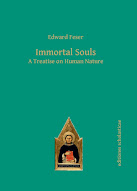Saturday, June 29, 2024
Hobbes and Kant on capital punishment
Friday, June 21, 2024
Immortal Souls in eBook format
Tuesday, June 18, 2024
Scruton on tradition
Modern liberals tend to scoff at the idea of tradition. All traditions, they tell us, are “invented,” implying that they can therefore be replaced with impunity. This idea is plausible only if you take the trivial examples – Scottish country dancing, Highland dress, the Coronation ceremony, Christmas cards, and whatever else comes with a “heritage” label. A real tradition is not an invention; it is the unintended byproduct of invention, which also makes invention possible… [A] tradition, precisely because it is not invented, has authority. “Unintended byproducts” of invention contain more knowledge than any person can discover unaided.
Friday, June 7, 2024
Immortal Souls now available for pre-order
Immortal Souls provides as ambitious and complete a defense of Aristotelian-Thomistic philosophical anthropology as is currently in print. Among the many topics covered are the reality and unity of the self, the immateriality of the intellect, the freedom of the will, the immortality of the soul, the critique of artificial intelligence, and the refutation of both Cartesian and materialist conceptions of human nature. Along the way, the main rival positions in contemporary philosophy and science are thoroughly engaged with and rebutted.






